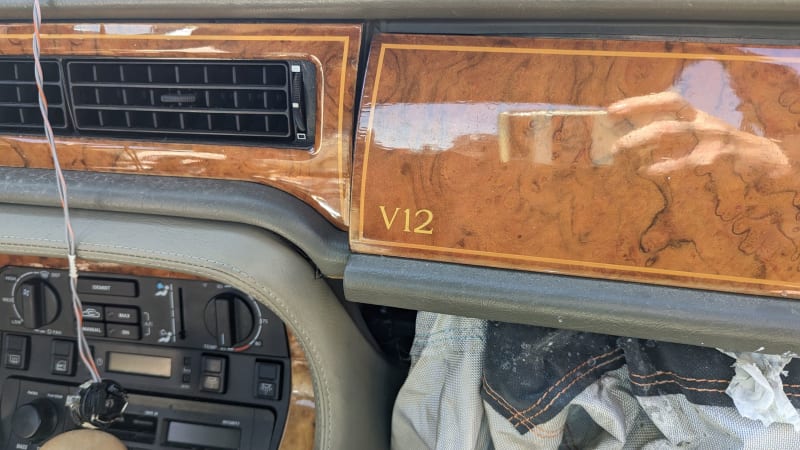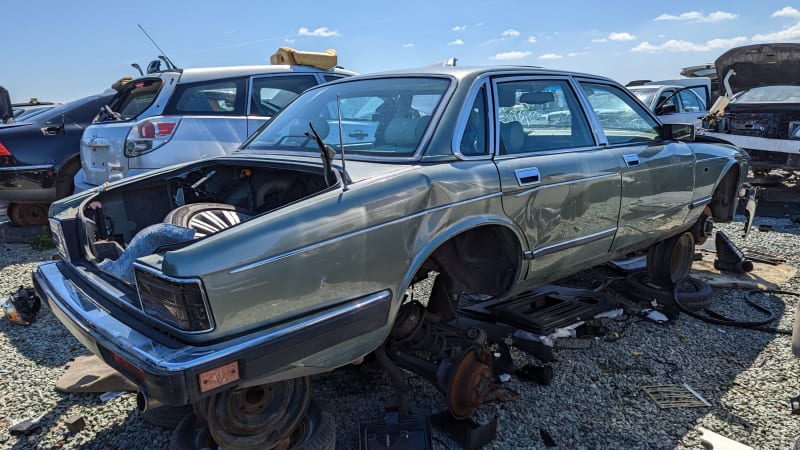Junkyard Gem: 1994 Jaguar XJ12

While Americans were able to buy new Jaguar two-doors with V12 engines under their bonnets from 1971 all the way through 1996, availability of new Jaguar 12-cylinder sedans was much spottier here. The Series 1 and Series 2 XJ12s were sold here from the 1973 through 1979 model years, and then there was a grim Jaguar V12 four-door drought here all the way until the 1994 model year. Here’s one of those very rare felines, found in a Northern California boneyard in April.
Jaguar had developed the XJ40 successor to the Series 3 XJ over an agonizingly protracted period that spanned the British Leyland era of the early 1970s through the first production cars being shown to the world in 1986. The XJ40 first appeared in the United States as a 1988 model. The following year, the Ford Motor Company bought Jaguar.

The engineers in Coventry struggled to design a viable V12-engined XJ40 for years, giving it the XJ81 designation. At long last, the XJ81 was revealed to the motoring world in 1993… just prior to the replacement of the XJ40 by the XJ300 for the 1995 model year. All of the XJ81s sold in the United States—just over 1,500 of them in all—were 1994 models.

This junkyard provided a bonanza of rare European iron when I stopped by on that chilly spring morning. Located within a few rows of this one-year-only XJ81 were a Volkswagen Phaeton and a Rolls-Royce Silver Shadow. The yard also had a running Peugeot 504 for sale in their “builders” section, and I’ll admit I was very tempted by it.

The April 1994 production date indicates that this is one of the very last members of the XJ40/XJ81 family to be built (though Jaguar continued to use platforms derived from the XJ40 until the X350a arrived as 2003 models).

This 6.0-liter engine was an excruciatingly tight fit in this engine compartment (there are semi-credible tales that the XJ40’s engine compartment was made so narrow as a sneaky office-politics means of preventing British Leyland from installing Rover V8s in Jaguars), and working on it must be a mechanic’s nightmare. Output was 301 horsepower and 336 pound-feet. Meanwhile, Mercedes-Benz’s V12 was rated at 389 horsepower and 420 pound-feet, while BMW’s V12 had 296 horsepower and 332 pound-feet.

The MSRP for this car was $73,200 for the dual-airbag version (and we can see that both airbags were deployed in this car’s career-ending crash). That amounts to $151,889 in 2023 dollars.

That price was pretty good compared to that of the 1993 BMW 750iL, which cost $83,950 ($174,195 today) and the $130,300 1993 Mercedes-Benz S600 sedan ($270,371 now), especially when you look at the Jag’s gentlemanly wood-and-leather interior.
 This car looks to have been in good shape prior to the crash that bent its frame and generally twisted all the bodywork.
This car looks to have been in good shape prior to the crash that bent its frame and generally twisted all the bodywork.

The XJ12 returned to America on the Ford-centric X300/X305 platform for 1995, with XJ12 sales here terminating after 1996.
Jaguar has a design philosophy… that doesn’t change with the wind.



